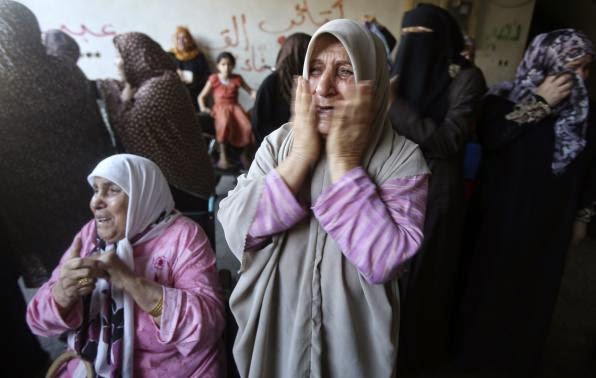Censured over shelter deaths, Israel declares seven-hour Gaza truce
Israel said it would unilaterally hold fire in most of the Gaza Strip on Monday to facilitate the entry of humanitarian aid and allow some of the hundreds of thousands of Palestinians displaced by an almost four-week-old war to go back to home.
The announcement, made first to Palestinian media, met with suspicion from Gaza's dominant Hamas Islamists and followed unusually strong censure from Washington at the apparent Israeli shelling on Sunday of a U.N.-run shelter that killed 10 people.
An Israeli defense official said the ceasefire, from 10 a.m. to 5 p.m, would apply everywhere but areas of the southern town of Rafah where ground forces have intensified assaults after three soldiers died in a Hamas ambush there on Friday.
"If the truce is breached, the military will return fire during the declared duration of the truce," the official said.
The official said east Rafah was the only urban area in which troops and tanks were still present, having been withdrawn or redeployed near Gaza's border with Israel over the weekend.
Israel is winding down its offensive in the absence of a mediated disengagement deal with Hamas. It says the military is close to completing its main objective of destroying cross-border infiltration tunnels from Gaza and prepared to resume strikes in response to any future attacks by the Palestinians.
Hamas, whose envoys are in Egypt for truce negotiations that Israel has shunned in anger at Friday's lethal ambush in Rafah, saw a possible ruse in the humanitarian truce announcement.
"The calm Israel declared is unilateral and aims to divert attention away from the Israeli massacres. We do not trust such a calm and we urge our people to exercise caution," said the group's spokesman, Sami Abu Zuhri.
Israel launched its offensive on July 8 following a surge in Hamas rocket salvoes. It escalated from air and naval barrages to overland incursions centered on Gaza's tunnel-riddled eastern frontier but also pushing into densely populated towns.
Gaza officials say 1,788 Palestinians, most of them civilians, have been killed and more than a quarter of the impoverished enclave's 1.8 million residents displaced. As many as 3,000 Palestinian homes have been destroyed or damaged.
"DISGRACEFUL SHELLING"
Many of those evacuees took shelter in U.N.-run facilities, including a Rafah school where 10 people were killed on Sunday in what Gaza officials said was an Israeli air strike.
Israel said it was investigating the incident and that it may have been linked to an attempt by the military to kill gunmen from Hamas' kindred faction, Islamic Jihad, as they drove nearby.
International outcry crested against the Israelis.
U.N. Secretary-General Ban Ki-moon described the attack as a "moral outrage and a criminal act" and called for those responsible for the "gross violation of international humanitarian law" to be held accountable.
The United States said it was "appalled" by the "disgraceful shelling" and urged its Middle East ally to do more to prevent harm to civilians. Washington also called for an investigation into other, similar attacks on U.N. schools in Gaza.
Israel says it makes every effort to avoid non-combatant casualties and that Hamas invites these by launching rockets from and entrenching gunmen inside congested civilian areas.
"Hamas has an interest in Gaza residents suffering, thinking that the world will blame Israel for their suffering," Prime Minister Benjamin Netanyahu's office said in a statement on Monday, adding that Israel was allowing foreign aid shipments to enter the Palestinian territory.
The statement said Hamas had further inflamed the humanitarian crisis by turning U.N. facilities into "terrorist hotspots". The main U.N. agency in Gaza, UNRWA, says it has found rockets in three of its schools.
Israel has lost 64 soldiers in combat and three civilians to Palestinian cross-border shelling that has emptied many of its southern villages. Iron Dome interceptors, air raid sirens and public shelters have helped stem Israeli casualties from the Gazan rockets.
Egyptian truce mediation, supported by the United States and the United Nations and also involving Qatar, Turkey and Western-backed Palestinian President Mahmoud Abbas, has been complicated by the dramatically divergent terms set by Israel and Hamas.
Israel has said Gaza must be stripped of tunnels and rocket stocks. Hamas rules this out, and demands an easing of the crippling Gaza blockade enforced by both Israel and Egypt, which consider the Palestinian Islamists a security threat.
In Cairo on Sunday, Palestinian delegates said they also wanted Israel to quit Gaza, facilitate reconstruction of the battered territory and release Palestinian prisoners.
The Israelis, however, have shown little interest in resuming negotiations after blaming Hamas for violating Friday's truce with the Rafah ambush - an accusation echoed by the United States and the United Nations, though disputed by Hamas.


